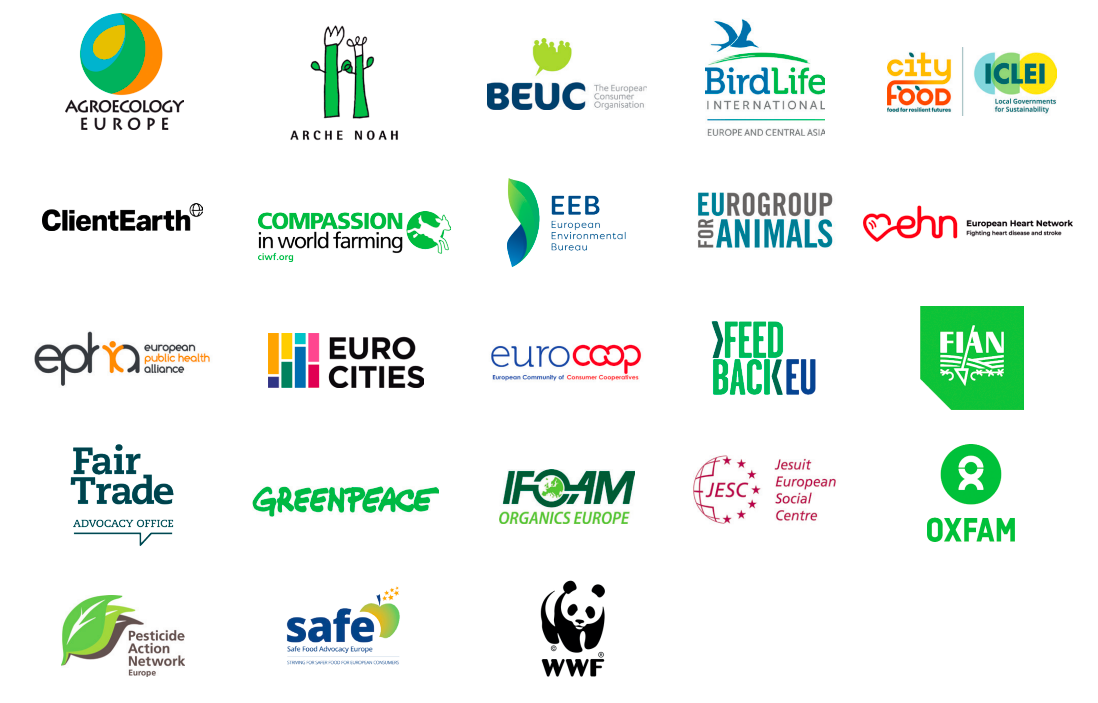Brussels, 1 March 2024
Dear President von der Leyen,
Cc: Executive Vice-President Maroš Šefčovič, Commissioners Stella Kyriakides, Janusz Wojciechowski and Virginijus Sinkevičius
We, the undersigned organisations, are urging you to call on the next Commission to make the transition to sustainable food systems a high political priority. The next Commission must uphold a holistic food systems approach to policy–making, relying on a multi-DG governance structure, and bring forth the long-awaited proposal for a legislative framework for sustainable food systems.
The Commission’s reaction to farmers’ protests, opting to roll back sustainability policies instead of adopting necessary long-term measures, fails to respond to farmers’ demands for fair prices and a viable future. This approach will only put at risk the sustainability of farming in Europe, and exacerbate global crises that jeopardise the well-being of citizens, including farmers, and future generations. It also undermines the credibility and ‘raison d’être’ of the Strategic Dialogue on the Future of Agriculture which you established to overcome polarisation and shape a shared vision for the future of the EU food and farming system. With science as the starting point, the Strategic Dialogue can and should serve to build a consensus on how to achieve the transition to a sustainable EU food system and inform comprehensive policy action of the next Commission.
The consequences of inaction in light of today’s unsustainable food systems, and climate, biodiversity, health and cost-of-living crises, are socially, environmentally and economically prohibitive. We therefore call on you to recommend making the necessary food system transformation a priority for the upcoming Commission. We would also like to kindly request a meeting with you to discuss the approach your Commission is taking to address farmers’ concerns.
Please refer to the ANNEX for insights on the need for a food systems approach and multi-DG governance, as well as on food system transformation as a solution to today’s crises.
Yours sincerely,

ANNEX
Why we need a food systems approach and multi-DG governance
EU policy making in the next Commission’s mandate must continue to pursue an integrated food systems approach instead of backsliding into a sole focus on the production side. In recognition of the food system’s complexity, policies must consider it in its entirety: from production to consumption and involving actors at all levels of governance including cities. The role of commercial actors such as traders, food processors and retailers in shaping food systems and food environments, as well as their responsibilities in the transition must be fully considered and addressed, or farmers and fishers will be left to carry the burden, which would be unfair and ineffective. We urge you to call on the next Commission to build on the progress you have made at the EU level in integrating diverse policy areas related to food systems under the Farm to Fork Strategy and issue the legislative framework for sustainable food systems.
To establish a unified EU vision for the future of food systems, a range of issues must be considered that extend far beyond the realm of agriculture and fisheries, including health, climate, environment, trade, finance and animal welfare. In terms of governance this translates to competence sharing among EU institutions, including the Directorate Generals SANTE, ENV, CLIMA, AGRI, MARE, GROW, TRADE, as well as within different Council formations and Parliamentary Committees. Such a collaborative effort holds significant potential to improve policy coherence in EU food and farming, a crucial need highlighted by SAPEA (2020) in the transition to sustainable food systems.
Food system transformation is a solution to today’s interlinked global crises
Global challenges such as climate change, biodiversity loss, the increasing prevalence of diet-related diseases, the worsening cost-of-living crisis for citizens and farmers, as well as the ongoing war in Ukraine are quickly escalating. Our food systems cause human suffering and planetary harm valued at well above 10 trillion USD a year, while food system transformation net benefits would be worth 5 to 10 trillion USD a year, equivalent to between 4 and 8 percent of global GDP in 2020. As recognised on multiple occasions by this Commission, the EU food system is itself no longer fit-for-purpose and needs to undergo a transformation. Therefore, the transition to a socially, environmentally and economically sustainable food system, in which everyone has equal access to healthy, sustainable food produced in a socially just way at all times, emerges as an even more pressing priority for the next Commission.
A systemic transition to sustainability is crucial to the resilience of our food systems, on which the survival and well-being of current and future generations depend. A move to socially and environmentally sustainable farming centred on higher animal welfare, organic and other agroecological practices, anchored in local ecosystems, combined with a shift to healthy, plant-rich diets will improve the EU’s strategic independence by reducing our dependency on fertiliser, animal product and feed imports, as well as pesticides. It is therefore key for the next Commission to continue the work started under your impulse to build a strong consensus on a shared pathway towards an EU food system that contributes to mitigating and adapting to climate change, reversing biodiversity loss, therefore contributing to long-term food security and socio-political stability. Building such a consensus will be instrumental to the much-needed adoption of comprehensive – and therefore effective – policies, such as the EU legislative framework for sustainable food systems and an ambitious EU 2040 climate target. Such a target must start from a net GHG-reduction of 90-95% and be followed by a scientifically-sound policy package ensuring the adequate contribution of agriculture to GHG-reduction efforts, thereby contributing to food system transformation.
The EU is well-positioned to take a leading role to support the transformation of food systems at the global level, but must embrace policy coherence to do so.

